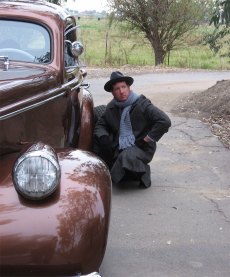Jack Stories


 stranger’s door. He will assume I am a thief or a louse. He probably won’t care that I have a flat tire. He won’t care about his fellow man. He is probably the kind of guy who kills small animals just for fun. He might even try to beat me up.
stranger’s door. He will assume I am a thief or a louse. He probably won’t care that I have a flat tire. He won’t care about his fellow man. He is probably the kind of guy who kills small animals just for fun. He might even try to beat me up. Sometimes we make up Jack Stories because of experiences we’ve had as children. As a little Mennonite girl getting on a public school bus with our Amish neighbors, we got lots of rejection. As a result, in other situations, I often assumed for no good reason that people would reject me. My Jack Story might have gone something like this: “I know these people won’t like me. They probably think I’m stupid and won’t want anything to do with me. I’d better avoid them.” Rather than punching people in the nose, I kept my distance; in essence, rejecting them before they could reject me, although I never saw it that way.
Sometimes we make up Jack Stories because of experiences we’ve had as children. As a little Mennonite girl getting on a public school bus with our Amish neighbors, we got lots of rejection. As a result, in other situations, I often assumed for no good reason that people would reject me. My Jack Story might have gone something like this: “I know these people won’t like me. They probably think I’m stupid and won’t want anything to do with me. I’d better avoid them.” Rather than punching people in the nose, I kept my distance; in essence, rejecting them before they could reject me, although I never saw it that way. probably forget the words or sing the wrong notes. Everyone will think I’m an idiot.” Or because of stereotypes we’ve believed. “White people are not to be trusted. Two of them took advantage of my sister and I’ve hated white people ever since. I’d have to be a real nut case to think they really want to be my friends.”
probably forget the words or sing the wrong notes. Everyone will think I’m an idiot.” Or because of stereotypes we’ve believed. “White people are not to be trusted. Two of them took advantage of my sister and I’ve hated white people ever since. I’d have to be a real nut case to think they really want to be my friends.” It’s true some temperaments have a tendency toward more negative thinking than others, especially melancholies. However, Tim LaHaye did a study on the fruit of the Spirit with a football team and discovered that for every temperament weakness, there is a fruit of the Spirit which will compensate for that weakness if we allow the Lord to develop it in us. So there’s never an excuse for saying, “This is just the way I am” when it comes to negative thinking.
It’s true some temperaments have a tendency toward more negative thinking than others, especially melancholies. However, Tim LaHaye did a study on the fruit of the Spirit with a football team and discovered that for every temperament weakness, there is a fruit of the Spirit which will compensate for that weakness if we allow the Lord to develop it in us. So there’s never an excuse for saying, “This is just the way I am” when it comes to negative thinking.
4 thoughts on “Jack Stories”
AAA (American Automobile Association) was founded in 1902. It would not have been wise to be driving an expensive automobile out in the country before 1902 (no Fords or Chevys back then, but there were Cadilacs), and it would have been especially foolish to be out driving without a tool box, spare parts, and an inner tube patching kit with you. Few farmers would have had telephones at that time, so Jack was indeed a foolish man.
Thank you for sharing this story.
Thanks, Karen!
Great story Daisy!
Thanks, Dwight!